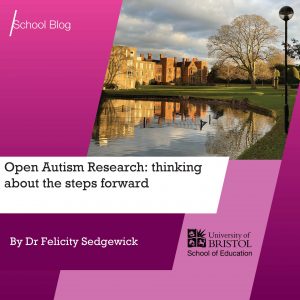 Blog by Dr Felicity Sedgewick, Masters Level Psychology Programme Director, School of Education, University of Bristol
Blog by Dr Felicity Sedgewick, Masters Level Psychology Programme Director, School of Education, University of Bristol
The best way to start the new year (in my opinion) is spending a day with interesting people talking about interesting ideas. In early January, that is exactly what a group of autism researchers (autistic and non-autistic, from a range of career stages), autistic people, and charity and journal representatives did.
The group, led by Dr Hannah Hobson from the University of York, got together to talk about their shared interest in how to improve and increase Open Research practices in autism research. Open Research is defined by principles of transparency – making processes, plans, analyses, and data accessible – in order to remove some of the mysticism around research and its findings. The motto “as open as possible, as closed as necessary” was used a lot, reflecting the need for thinking about the ethics of participant protection within this approach – especially for researchers who are working with potentially vulnerable autistic people.
It was the first in-person meeting of the group, who have previously virtually worked together to launch a call for autism journals to accept registered reports, which gained over 100 signatures. Registered reports are when researchers publish their rationale and planned analyses with a journal, on the understanding that as long as they stick to the stated plans, the journal will then publish the findings as well. If the plans have to change for some reason, the researchers have to include an explanation of the changes and how they were handled, rather than pretending that this was the plan all along. One journal to date has responded and said that they will now accept registered reports (Research in Autism Spectrum Disorders), with some others letting the team know that they are discussing the idea.
This meeting was for the team to start thinking about what comes next in the campaign to make Open Research practices standard in the autism field. The day started with a conversation of who is involved in, and who would be affected by, more open autism research, as well as who would use it. Researchers, autistic people, and journals were the obvious starting points, but we also talked about policymakers, charities, and students, thinking about the ways in which each group could benefit, what they might be worried about, and how they could help to be more Open in their engagement with research generally.
Moving towards lunch, the discussion moved on to working out what are the major issues facing Open Autism Research and trying to identify problems which have obvious ‘fixes’. Unsurprisingly for a first conversation, we found more problems than solutions, but it always helps to know where you are starting!
The final part of the day was a conversation about the potential next steps and trying to make some plans. In the long term, we are hoping to be able to put together a funding grant to create materials guiding researchers in conducting good quality Open Autism Research. More immediately, we have a website (https://sites.google.com/york.ac.uk/openautismresearch/home ), and are planning to write an editorial about Open Autism Research in the journal Autism in the spring.
So, look out for that, visit the website, and get thinking about how you could be more open in your own work. There will be lots of updates to come!
Information
‘What is Open Research?’: http://www.exeter.ac.uk/research/openresearch/about/explained/
Open Autism Research group: https://sites.google.com/york.ac.uk/openautismresearch/home?authuser=0
RASD are currently calling for registered reports, you can submit here: https://www.journals.elsevier.com/research-in-autism-spectrum-disorders/call-for-papers/registered-reports-in-autism-research
